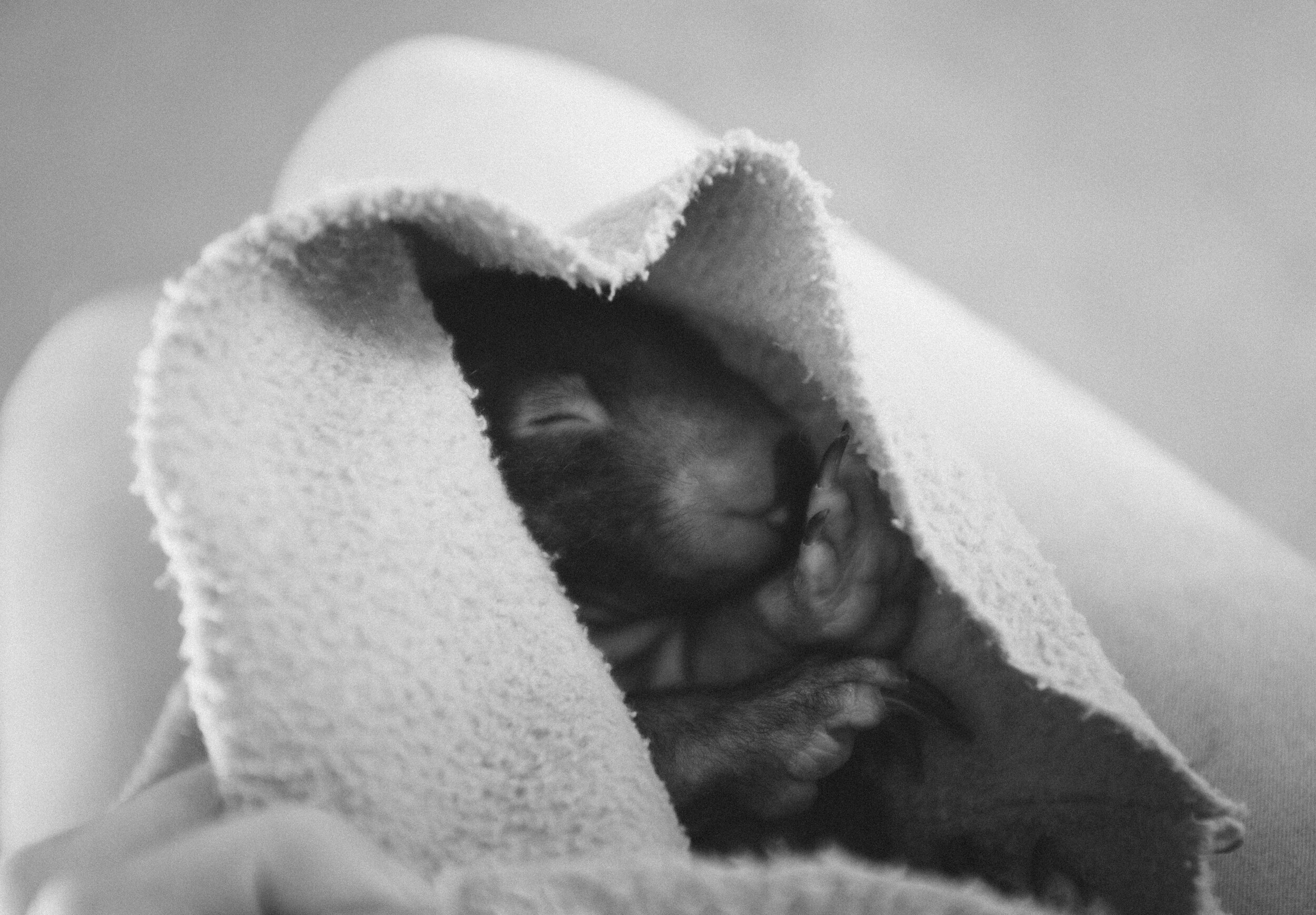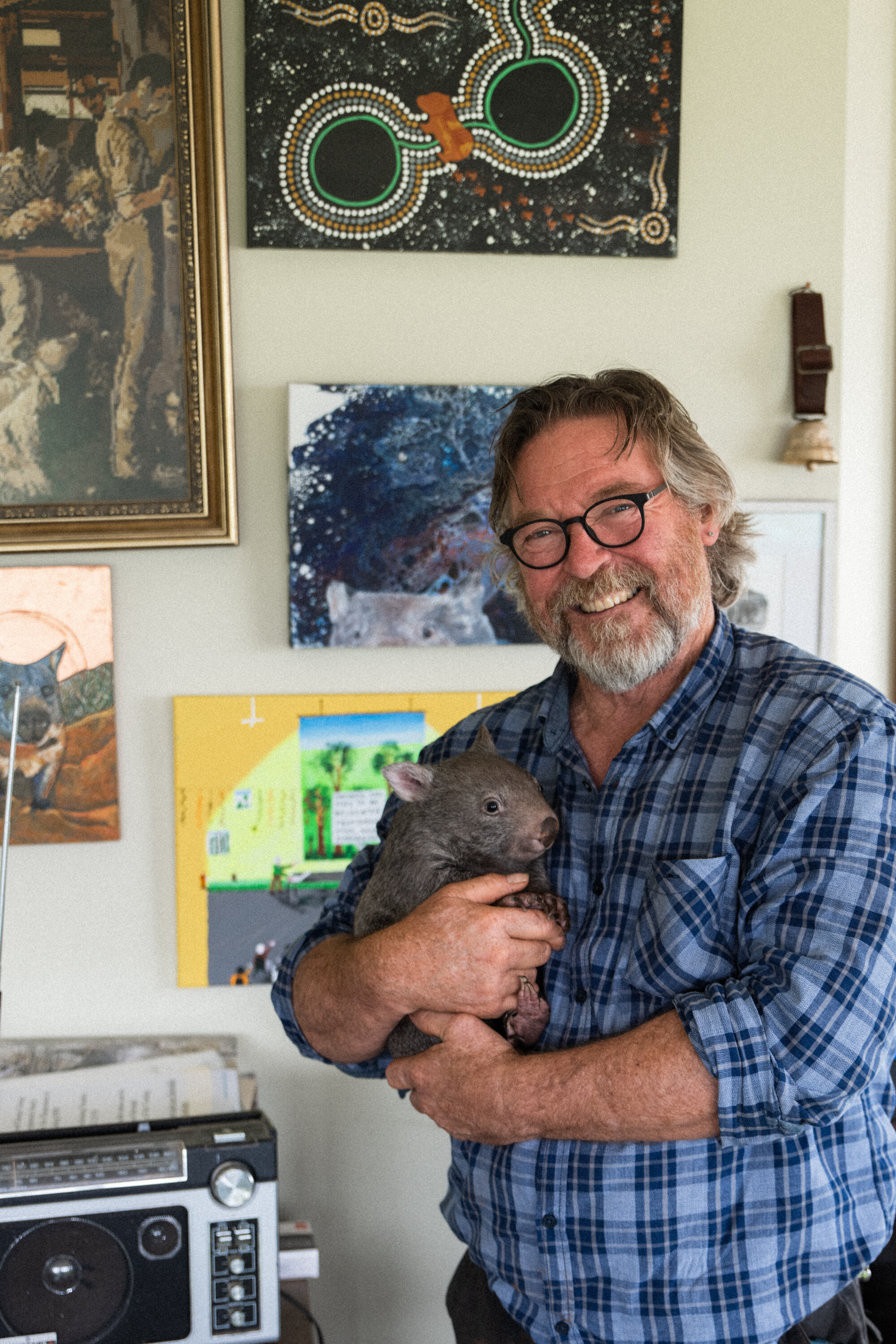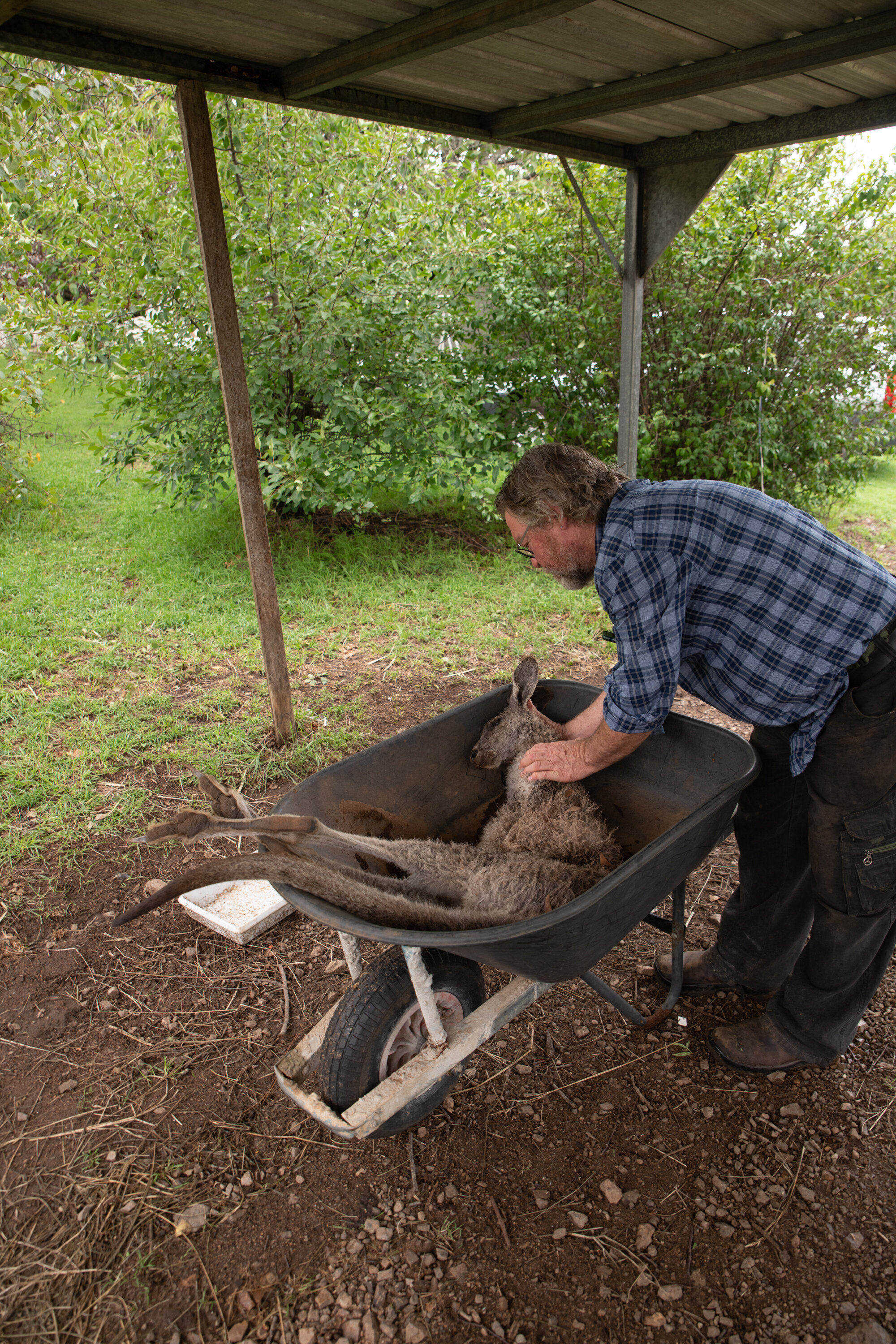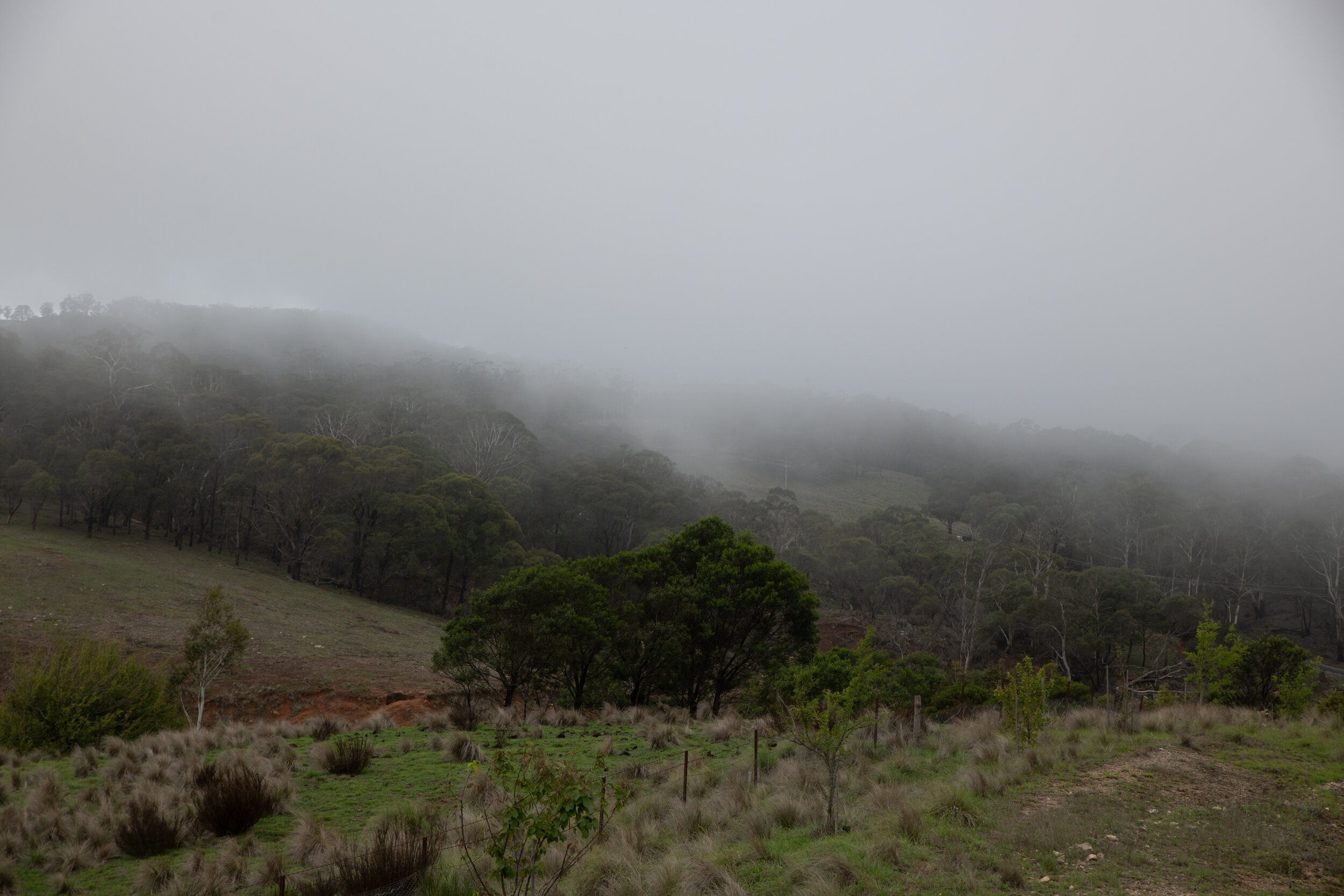Wombat Bill
Bill Waterhouse with baby wombat Xena who was orphaned, in his Major’s Creek home and Wombat Refuge in New South Wales
Bill, fondly called Wombat Bill, by those who know and love him, has been running a wombat refuge with his partner Lesley for almost two decades.
The day I met Bill Waterhouse at his wombat refuge in Majors Creek NSW, was not a good day for Bill.
I arrived at the gate of his bright orange farmhouse on a wet and grey Monday afternoon. Bill met me outside with a look on his face that said it all, his words soon followed when I asked him how he was, “it hasn’t been a good day for us here” he answered, his voice low and tired.
He put on a pot of tea and we sat down at his dining room table which was strewn with maps and wombat food, books, writings, and miscellaneous animal rescue supplies.
Bill, fondly called Wombat Bill, by those who know and love him, has been running a wombat refuge with his partner Lesley for almost two decades. In addition to rehabilitating sick, injured and orphaned wombats he volunteers for a variety of the major wildlife rescue groups and helps rescue any animal that may need his aid. A spirit of kindness and generosity quietly permeate all that he and Lesley do at their refuge in Major’s Creek.
“This is a nightmare”
The day before my visit to Major’s Creek, New South Wales had been hit with flash flooding, the first serious rain Australia had seen in a year, and it arrived on the heels of the worst bushfire season in the country’s history. An exhausting 3 months of relentless bushfires had left the state of NSW with 2,000 homes destroyed and the country with an estimated total of 1 billion animals killed and over 46 million acres burnt to the ground.
While Australia was desperate for rain, the floods came and set in motion a new slew of crises for NSW, and the worst misfortune seemed to target the native animals and their committed caretakers once again.
“This is a nightmare” Bill said gravely “we live in a mountain range. This water has taken all the debris off the ground and washed it down the rivers. It’s the worst rain we could have had. Long, slow, steady would have been fine. We were in a drought before the fires. There was no grass growing. Whatever small brown bush was growing was burnt immediately…This fire was so hot it burnt swamp. And rainforest. The Monga is a cool wet rainforest. And it burnt.”
“A year of drought. Followed by 3 months of bushfires. And then; nearly a foot of rain, in a day. We’ve only got pestilence to go and I think we’ve covered the four horsemen of the apocalypse.”
Earlier that day Bill had been called with news that a female Kangaroo had been found in the forest in very bad shape and she needed care immediately. Bill had rushed to the scene to pick up the kangaroo and bring her home for treatment.
By the time I arrived, about an hour later, the poor roo had passed. She was just too unwell. Bill believed her death had likely been caused by prolonged smoke inhalation and the ongoing stress so many of these animals had been subjected to over the past year of drought, fires and flooding.
When I asked if I could take a picture of the kangaroo he had tried to rescue, who had died earlier in the day, Bill said “let me make her look a little more dignified” as he gently re-positioned her. He stood next to her while I took her photo. He had done everything he could to try to save her.
"It's almost a paranoia, it's picking on us, it's killing all the native animals in the forests, and then it's picking on the people who are trying to save them."
His eyes were red as he said slowly, “on top of that, we are finding drowned wombats everywhere. The wombats live underground in burrows often by swamps and they have all just been drowned out.”
Bill and his partner Lesley had spent much of the day frantically trying to get their hands on two orphaned baby wombats who had been rescued from the floods by some of their neighbors. But the neighbors were trapped, surrounded by flooded creeks filled with debris and far too perilous to cross.
If Lesley and Bill couldn’t get to the baby wombats soon to feed them, they would likely die. Bill and Lesley were glued to their phones waiting for updates on the baby wombats, doing everything they could to keep them alive from afar.
As I sat with Bill listening to his stories, the heaviness of their circumstances was palpable and inescapable. Native wildlife caretakers all over Australia are trying desperately to pick up the pieces after an endless barrage of devastating natural disasters.
They have been in survival mode for many months and the damage at this point, to the land, the animals, and their habitats, is so profound, that many of them feel quite hopeless. And without a doubt, many of those who have been touched by these fires and floods are suffering from PTSD at this point.
Major’s Creek
Bill was evacuated three times during the fires. At one point there were three different fires, coming from three different directions, all headed towards his refuge and home.
They scrambled furiously to get all the wombats out and deliver them to any number of other local sanctuaries. They packed up what felt like the most important sentimental items into the back of cars; guitars, family videos, pictures, and whatever else they could squeeze in. They left their home not knowing what they would return to when the fires finally subsided.
But as fate would have it, Bill’s beautiful wombat refuge survived the fires. It felt like no less than a miracle when they were finally able to go home and discovered their refuge was still in good shape and the small, pristine and lush valley of Major’s Creek had been spared.
While Bill’s refuge and wombats did survive, the damage these fires have done to the people of Australia runs far deeper than that which can be seen with the eye.
It’s been an emotionally draining 3 months for himself and so many others. He has forced himself to say goodbye to his home many times over and has had to watch any number of his friends lose everything they have. And in the midst of it all, he has had to watch on in horror as the beloved wild animals Australia have been forced to suffer through a crisis which they had no way to evacuate.
Bill tells me with a heavy heart of his dear friend James Fitzgerald who runs the Two Thumbs Wildlife Trust, a trio of koala sanctuaries as well as a rehabilitation center where he houses injured and orphaned koalas to help them recuperate. Injured wildlife from many different parts of New South Wales are released back into these sanctuaries when they are ready to return to the wild. This particular land has been vital to the preservation of any number of threatened species which thrive here.
When the first big fire in this area erupted, the Black Range Fire on November 26th, James rushed to Bill’s wombat sanctuary to help them prepare. James ended up spending 5 weeks at the wombat sanctuary, evacuating wombats and rescuing native animals from the bushfires around the Braidwood area.
By late January the fires had rapidly spread and had moved in the direction of James’ home. James, also a volunteer RFS member, returned home to help the other volunteers fight the Good Good fire which was steadily creeping towards his Wildlife center. The Good Good fire ended up burning approximately 36,000 hectares of land, most of which was Koala habitat.
This fire ended up burning 2 km into the Kalandan Wildlife Sanctuary (one of the trios of sanctuaries which he maintains) but the fire stopped 200 meters from his house.
And then, just when they must have thought they were out of the woods, another fire flared up and ripped through his property, burning his house and flattening his animal enclosures. Some of the Koalas which had been saved from the other fires and were being rehabilitated at his sanctuary, perished in the fire. He lost everything.
The country is still in crisis and many parts of New South Wales look like an absolute warzone. Black earth and burnt trees as far as the eye can see. Bill expressed his concern over the many people who have been displaced and are now living in tents. “tents! In this rain? Can you imagine it?”
The view from Fox’s Elbow Road in Warri, 20 minutes north of Major’s Creek
Bill, and so many others involved in the caretaking of native wildlife have been astounded that there was no strategic government led emergency response in place to help the animals as the crisis unfolded. It was all up to the non-profits and independent wildlife refuges and sanctuaries, who receive no government funding and are often run by volunteers who have full on day jobs just so they can afford to take care of animals. And it was a heavy burden to bear. In the aftermath of these disasters, many are expressing that they feel completely forgotten by the government.
Towards the end of our interview, Lesley came in and handed me Xena, a 3 month old orphaned baby wombat the size of a grapefruit, who was in their care. She squirmed trying to find a snug spot in her fleece pouch. As I stroked her little soft head, she looked up at me with her curious black eyes. Such innocence and utter vulnerability. We live on the land of these animals. Not the other way around. They deserve better from us…and so do their carers.
Photography + writing by Olivia Savile Katz | Reachable via TheHeartAtlas@gmail.com
Baby Xena
These organizations survive on the generosity of community support. If you can, please consider making donations to Bill and Lesley Waterhouse of Major’s Creek Wombat Refuge and James of the Two Thumbs Wildlife Trust. At this time, donations made directly to the people, organizations, and communities affected by the fires are most helpful as it gives them immediate access to much needed funding.
Major’s Creek Wombat Refuge:
https://www.wombatrefuge.com.au/sponsor-a-wombat
https://www.gofundme.com/f/majorscreekwombats/donate
Two Thumbs Wildlife Trust, Koala Habitat and Bushfire Research Fundraiser: https://www.gofundme.com/f/koala-habitat-and-bushfire-research-fundraiser



















